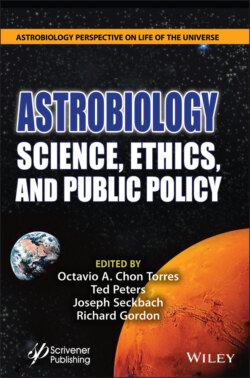Читать книгу Astrobiology - Группа авторов - Страница 33
2.3.2 Does Off-Earth Life Have Intrinsic Value?
ОглавлениеIn 2020 a possible biosignature was spotted on Venus. It is not life itself, to be sure. Rather, it is a spectral fingerprint, a light-based signature of phosphine in Venus’ harsh sulfuric atmosphere. Even if there is no life on the 900-degree surface, perhaps microbes make their home in the Venusian clouds.
NASA scientists have long given credence to the panspermia hypothesis, namely, that a wandering asteroid entered our solar system during planet formation and seeded both Mars and Earth with life. This means life on Mars and Earth would turn out to be sisters, so to speak. But life on Venus and Earth would be strangers.
On the one hand, if the panspermia hypothesis gets confirmed, we could work with the assumption that the universe underwent a single origin of all life. This would make Martian life like Earth life. On the other hand, if the Venusian hypothesis gets confirmed, then this would mark a 2nd genesis of life. The sulfuric origin of life on Venus would likely differ from the carbon-based life that has evolved on Earth. Would it matter ethically if extraterrestrial life shares our genesis or derives from a second genesis?
Regardless of whether it is due to a shared genesis or a second genesis, astrobioethicists to date have been leaning toward ascribing intrinsic value to off-Earth biospheres. But they have not leaned far enough to tip completely. With the term “intrinsic value,” we intend “value that is truly independent of valuing agents” [2.43]. At work is a widespread assumption that intelligent life would warrant intrinsic value but non-intelligent life would not. Is this assumption sound?6
This is our quandary: Does life—even unintelligent life—have intrinsic value? Or, does the value of living organisms depend on the usefulness they have for us? Is worth inherent or instrumental? Do we terrestrial Homo sapiens have a responsibility toward extraterrestrial life based upon that life’s intrinsic worth or based strictly upon its usefulness to us? [2.64]. Almost no one to date has risen up to defend a brute instrumentalism. The predominant discussion takes place within the intrinsic value option.
Richard Randolph and Christopher McKay believe “that new operational policies for space exploration and astrobiology research must be developed within an ethical framework that values sustaining and expanding the richness and diversity” [2.49]. This applies to entire biospheres, not merely individual organisms. Even so we ask: Just how close to ascribing intrinsic value is this?
Taking a minimalist position, Charles Cockell acknowledges that extraterrestrial microbial life will make some level of demand on us earthlings: “Telorespect or teloempathy merely captures our recognition that extraterrestrial life, including life independently evolved from the biology that we know on Earth, placed demands on our behavior if we think it has intrinsic value” [2.16].
Kelly Smith moves one notch closer toward intrinsic value, distinguishing off-Earth species from what we know on our home planet. With the label “Mariophilia,” Smith posits that extraterrestrial “life would be extremely valuable and should be defended against petty demands of human beings, but also that human interests can in principle trump those of Martians” [2.79]. With this conditioned appeal to intrinsic value, terrestrial interests still trump extraterrestrial interests.
Octavio Chon-Torres goes beyond Smith. “The proposal that I have presented would include safeguarding the ‘rights’ of the Martian life to exist, that is, having an intrinsic value. And why not? Every form of life follows Darwinian mechanics and seeks to develop, insofar as it has that ‘interest’ has a value in itself. A separate question is whether the human being wants to respect it” [2.14].
We get some help from Oxford ecotheologian Celia Deane-Drummond, who would be satisfied with ranking value. “It is possible to hold to the notion of intrinsic value, while also being able to discriminate between different forms of life and non-life in terms of their worth” [2.24]. Or, to say it another way, even if we impute intrinsic value to all living things, within this broad category we may identify some living things to be of greater value or worth.
Even so, the astrobioethicist will ask: How do we decide? Without appealing to instrumental criteria for discriminating between greater or lesser worth, we should look for criteria within the scope of intrinsic value. Regardless of the answer, an astroethics of responsibility will enjoin us earthlings to care for off-Earth microbes and their respective biospheres.
